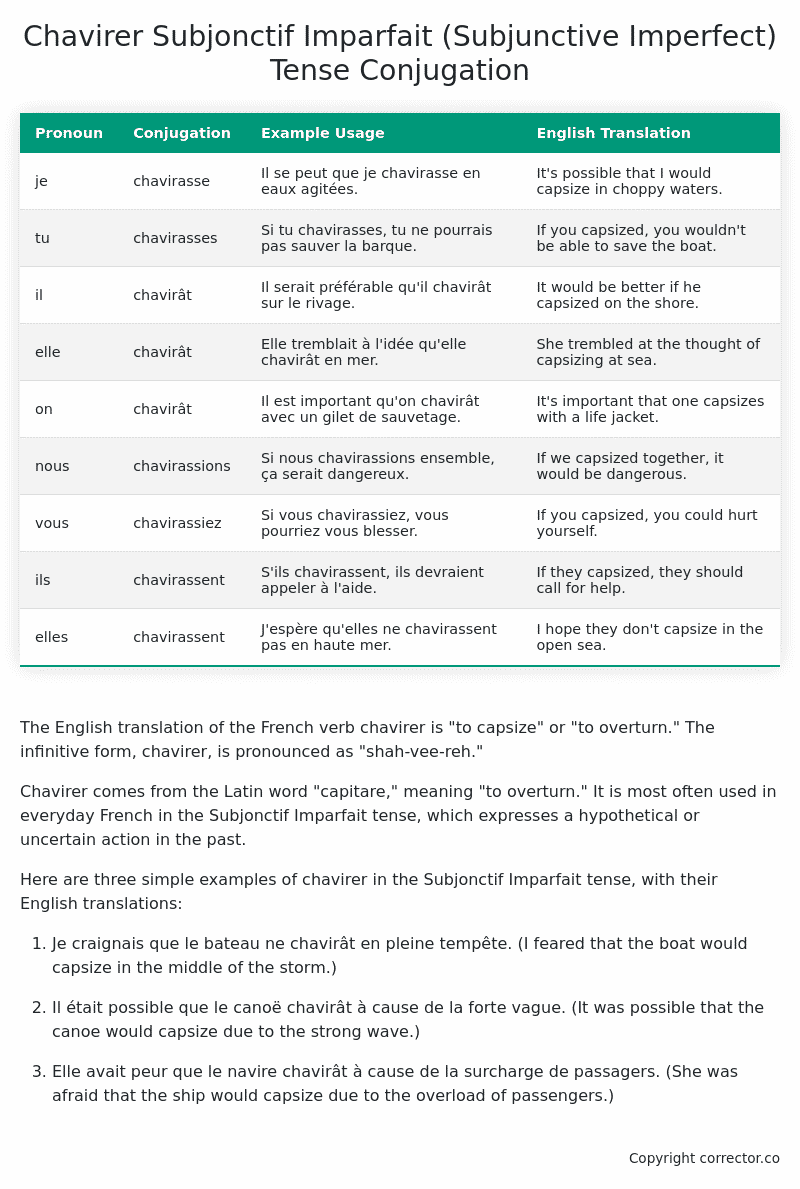Subjonctif Imparfait (Subjunctive Imperfect) Tense Conjugation of the French Verb chavirer
Introduction to the verb chavirer
The English translation of the French verb chavirer is “to capsize” or “to overturn.” The infinitive form, chavirer, is pronounced as “shah-vee-reh.”
Chavirer comes from the Latin word “capitare,” meaning “to overturn.” It is most often used in everyday French in the Subjonctif Imparfait tense, which expresses a hypothetical or uncertain action in the past.
Here are three simple examples of chavirer in the Subjonctif Imparfait tense, with their English translations:
-
Je craignais que le bateau ne chavirât en pleine tempête. (I feared that the boat would capsize in the middle of the storm.)
-
Il était possible que le canoë chavirât à cause de la forte vague. (It was possible that the canoe would capsize due to the strong wave.)
-
Elle avait peur que le navire chavirât à cause de la surcharge de passagers. (She was afraid that the ship would capsize due to the overload of passengers.)
Table of the Subjonctif Imparfait (Subjunctive Imperfect) Tense Conjugation of chavirer
| Pronoun | Conjugation | Example Usage | English Translation |
|---|---|---|---|
| je | chavirasse | Il se peut que je chavirasse en eaux agitées. | It’s possible that I would capsize in choppy waters. |
| tu | chavirasses | Si tu chavirasses, tu ne pourrais pas sauver la barque. | If you capsized, you wouldn’t be able to save the boat. |
| il | chavirât | Il serait préférable qu’il chavirât sur le rivage. | It would be better if he capsized on the shore. |
| elle | chavirât | Elle tremblait à l’idée qu’elle chavirât en mer. | She trembled at the thought of capsizing at sea. |
| on | chavirât | Il est important qu’on chavirât avec un gilet de sauvetage. | It’s important that one capsizes with a life jacket. |
| nous | chavirassions | Si nous chavirassions ensemble, ça serait dangereux. | If we capsized together, it would be dangerous. |
| vous | chavirassiez | Si vous chavirassiez, vous pourriez vous blesser. | If you capsized, you could hurt yourself. |
| ils | chavirassent | S’ils chavirassent, ils devraient appeler à l’aide. | If they capsized, they should call for help. |
| elles | chavirassent | J’espère qu’elles ne chavirassent pas en haute mer. | I hope they don’t capsize in the open sea. |
Other Conjugations for Chavirer.
Le Present (Present Tense) Conjugation of the French Verb chavirer
Imparfait (Imperfect) Tense Conjugation of the French Verb chavirer
Passé Simple (Simple Past) Tense Conjugation of the French Verb chavirer
Passé Composé (Present Perfect) Tense Conjugation of the French Verb chavirer
Futur Simple (Simple Future) Tense Conjugation of the French Verb chavirer
Futur Proche (Near Future) Tense Conjugation of the French Verb chavirer
Plus-que-parfait (Pluperfect) Tense Conjugation of the French Verb chavirer
Passé Antérieur (Past Anterior) Tense Conjugation of the French Verb chavirer
Futur Antérieur (Future Anterior) Tense Conjugation of the French Verb chavirer
Subjonctif Présent (Subjunctive Present) Tense Conjugation of the French Verb chavirer
Subjonctif Passé (Subjunctive Past) Tense Conjugation of the French Verb chavirer
Subjonctif Imparfait (Subjunctive Imperfect) Tense Conjugation of the French Verb chavirer (this article)
Subjonctif Plus-que-parfait (Subjunctive Pluperfect) Tense Conjugation of the French Verb chavirer
Conditionnel Présent (Conditional Present) Tense Conjugation of the French Verb chavirer
Conditionnel Passé (Conditional Past) Tense Conjugation of the French Verb chavirer
L’impératif Présent (Imperative Present) Tense Conjugation of the French Verb chavirer
L’infinitif Présent (Infinitive Present) Tense Conjugation of the French Verb chavirer
Struggling with French verbs or the language in general? Why not use our free French Grammar Checker – no registration required!
Get a FREE Download Study Sheet of this Conjugation 🔥
Simply right click the image below, click “save image” and get your free reference for the chavirer Subjonctif Imparfait tense conjugation!

Chavirer – About the French Subjonctif Imparfait (Subjunctive Imperfect) Tense
Formation
Common Everyday Usage Patterns
Interactions with Other Tenses
Subjonctif Présent
Indicatif Passé Composé
Conditional
Conditional Perfect
Summary
I hope you enjoyed this article on the verb chavirer. Still in a learning mood? Check out another TOTALLY random French verb conjugation!


